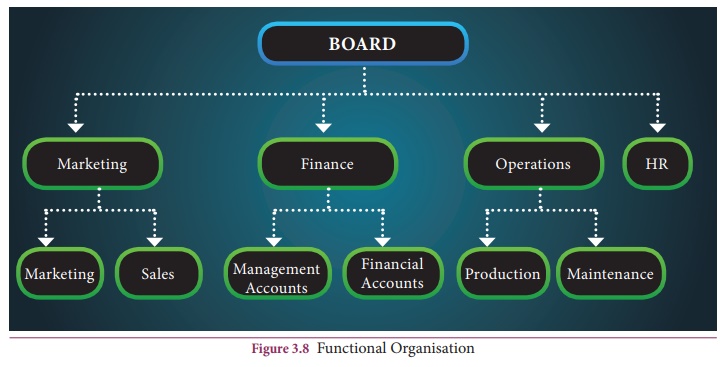Merits, Demerits, Suitability - Functional organization | 12th Office Management and Secretaryship : Chapter 3 : Organising Function
Chapter: 12th Office Management and Secretaryship : Chapter 3 : Organising Function
Functional organization
Functional organization
A functional
organisation is one where the work is organised on the basis of specialization.
In such an organisation, each specialist conveys his instructions direct to the
line personnel, rather than through a formal chain of command. This type of
organisation was devised by F.W. Taylor, the founder of the scientific management.
The various
functional departments in such an organisation provide various services to the
line mangers in respect of work study, maintenance, purchase of materials,
control of stocks, quality control etc. In the absence of service provided by these
departments, the line managers will be required to perform these functions on
their own.

Functional
organisation has developed from the increasing complexity of operations in an
enterprise (particularly in the production department) and the need to have
specialists to aid line executives. Functional organisation in one form or
other exists in all business concerns, particularly at the top. The very
division of the total activities of a business concern under production,
marketing, finance and personnel is an example of functional organisation.
Merits of Functional Organisation
Application of expert knowledge: Functional organisation promotes logical
division of work and leads to specialization at every work point.
Efficiency: Since the worker at each point concentrates on fewer activities, he
acquires proficiency in his area of work.
Relief to line executives: Functional organisation
results in a big relief to line executives, since instruction from specialists
flow directly to lower levels, line executives do not have to worry about the
routine technical problems faced by workers.
Mass Production: Functional organisation leads to specialisation
and standardisation which results in increase in production.
Economy: With each activity being in-charge of a number of specialists, there
is no need to have well-trained line executives at each work point.
Demerits of Functional Organisation
Complex relationships: Functional organisation
leads to too many cross-relationships between persons and departments. Since a
worker is placed under the charge of a number of bosses, he finds it difficult
to link up the different and conflicting orders received from them.
Ineffective Coordination: Difficulty in
determination of the limits of authority in case of each specialist creates
coordination problems.
Centralisation: Decision making on part of the
workers is very limited because of the availability of several specialists to
guide and direct them at each work point.
Suitability of Functional Organisation
Functional
organisation can be suitable for all kinds of enterprises - big or small,
machine-based or labour based. But to make a success of it, it should be
practiced only at higher levels. If practiced at lower levels, it may create
too many cross-relationships in which case it may become difficult to determine
who has authority after whom, who is responsible to whom and what work each one
is supposed to do.
Related Topics